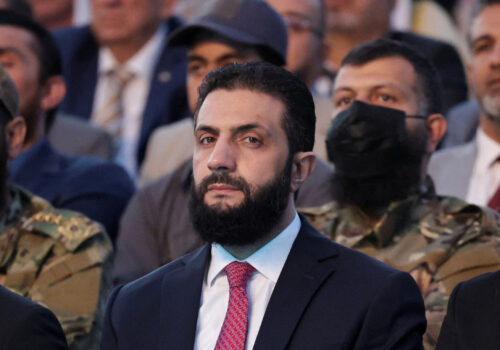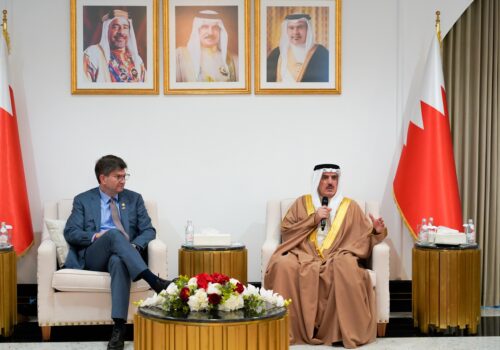Three Abraham Accords goals Trump should raise with Netanyahu
Israeli Prime Minister Benjamin Netanyahu is visiting Washington on Monday to discuss the status of Iran’s nuclear program and a potential Gaza ceasefire. But US President Donald Trump and his Middle East Envoy Steve Witkoff have also suggested that they want to seize this moment to expand the Abraham Accords, one of Trump’s major foreign policy accomplishments under his first administration.
There are compelling reasons to add the Abraham Accords to the agenda for Netanyahu’s visit. Israel’s ceasefire with Iran remains fragile, and any new Gaza ceasefire is certain to be, as well.
A strategic approach to the Abraham Accords, on the other hand, provides the architecture necessary for translating these ceasefires into more lasting stability in the Middle East. The Abraham Accords envision a new Middle East defined by regional integration that unlocks the region’s economic potential and prevents further costly conflicts via mutually beneficial forms of cooperation, much in the way Europe did after World War II. As one senior United Arab Emirates’ (UAE) official recently argued, this dynamic moment is the right time to pursue a more ambitious agenda for the Middle East that can help break its decades-long cycle of violence.
To realize the potential of the Abraham Accords, Trump and Netanyahu must focus on both expanding the accords and bolstering existing accords relationships. If Trump and Witkoff are serious about seizing this opportunity, here are three things they should raise during Netanyahu’s visit.
1. A coordinated, phased approach to Israeli-Syrian cooperation
While there is no easy or quick path to normalization between Syria and Israel, the current moment provides a historic opportunity to change the course of Syrian-Israeli relations and help prevent what could otherwise transform into another major Middle Eastern conflict. There are multiple factors at play that have created openings for an Israel-Syria reproachment unseen in the past seven decades: Syria’s current moment of transition, President Ahmed al-Sharaa’s highly pragmatic leadership approach, and support from crucial Gulf partners and the United States for de-escalation.
Al-Sharaa has prioritized reconciliation both inside Syria and with its neighbors. He has taken steps to demonstrate this commitment, including pressuring leaders associated with Hamas and other designated organizations to leave the country and granting the International Atomic Energy Agency full access to suspected nuclear sites. Qatar and Saudi Arabia have pledged to work together to provide financial support to Syria’s government. And, the United States has removed many of its sanctions against Syria and appointed a special envoy focused on Syria to oversee US diplomatic efforts.
Following the sea-changes in Syria over the past several months, media attention has focused on the potential for an Israeli-Syrian normalization deal. Trump’s own statements—including to al-Sharaa when they met in Riyadh in May—have fueled this speculation. But this attention can obscure the challenges to a normalization deal between two countries that have technically been at war for over seventy-five years, and the wide array of challenges that history brings.
SIGN UP FOR THIS WEEK IN THE MIDEAST NEWSLETTER
Challenges that would need to be addressed include control over the Golan Heights, the fact that Israel has continued military operations inside Syrian territory citing terrorist threats that fall far outside the control of al-Sharaa’s government, Turkey’s expanding role in Syria, and Israeli concerns about the Druze and Kurdish minority communities in Syria, among others.
Each of these issues present enormous challenges and are tied to the still-nascent process of reconstituting a Syrian state.
Seizing the opportunity of this transformational moment in Syria will require a patient, coordinated, and phased approach. This necessitates that the US uses diplomatic leverage with both Damascus and Jerusalem, and Washington’s Gulf partners offer economic support and incentives to the process. This will likely need to begin with confidence-building measures that can unlock interim security agreements, rather than immediate normalization.
Trump must be prepared to continue to support this process even if quick wins become elusive. Syria must be willing and able to provide solutions to discrete Israeli security concerns. Israel will have to be willing to make compromises, especially political and symbolic compromises necessary to make a deal feasible inside of Syria. As others have argued for the Atlantic Council, this means Israel must be willing to drastically shift its orientation towards Syria and support those who seek to integrate the country, rather than those who seek to divide it.
When they meet on Monday, Trump should stress Washington’s commitment to supporting a progressive path to Syrian-Israeli normalization, and engage Netanyahu on the need for these compromises.
2. Dialogue between Israel and Accords partners on Israel’s goals in Iran and Gaza
Netanyahu’s visit comes at a time when Israel’s Arab neighbors—including countries that have embraced the Accords like the UAE and Bahrain—are increasingly anxious that Israel is headed down a path of unbridled regional escalation, rather than targeted actions to address specific security threats from Iran and Hamas. These concerns were evident in a recent Congressional Delegation the N7 Initiative, a partnership between the Atlantic Council and the Jeffrey M. Talpins Foundation, sponsored to the Middle East. Securing Israeli commitments on expanding and strengthening the Abraham Accords is a positive step towards reassuring Israel’s increasingly anxious Arab neighbors that Israel is still committed to the shared vision of regional integration.
During Monday’s White House visit, Trump should encourage Netanyahu to engage in a serious dialogue with Abraham Accords countries as well as others about Israeli end-goals in both Iran and Gaza. These countries are essential to the solution in Iran and Gaza—whether it is a regional uranium enrichment consortium, as previously proposed by the Trump administration, or Arab Gulf support for Gaza’s reconstruction. But more importantly, Israel has an opportunity to demonstrate that it truly sees other Abraham Accords countries as partners by engaging them in strategic dialogue during this critical moment. In doing so, Israel can demonstrate that the accords are more than a piece of paper or a symbolic gesture.
3. Building out a strategic “mini-lateral” framework for the Abraham Accords
Bilateral coordination has continued between Israel and its Abraham Accords partners since the October 7, 2023 Hamas attack. But multilateral coordination, and the kind of structure necessary to turn the accords into a strategic network of countries capable of unlocking greater peace and prosperity in the Middle East, has in recent years faltered.
Following the momentum from the Iran ceasefire, Trump and Netanyahu have an opportunity to put the Abraham Accords back on track. If Trump succeeds in securing a new Gaza ceasefire, this momentum will only increase. To do so, they must agree on what a new “mini-lateral” framework for the accords should look like, in coordination with other accords partners, as I have argued previously. This framework could build on initiatives from the first Trump administration, such as the Middle East Strategic Alliance, as well as existing structures like the Comprehensive Security Integration and Prosperity Agreement.
At a volatile time when the regional security landscape is shifting, such a framework can both adapt to those new realities and provide valuable assurances to partners about a more stable future.
Between Iran and Gaza, Trump and Netanyahu will have a full agenda during the latter’s visit to Washington. But adding strengthening and expanding the Abraham Accords to the agenda is the best way to ensure the White House can help translate the major developments sweeping the Middle East into the vision for a new Middle East that Trump articulated during his visit to the region.
Allison Minor is the director of the N7 Initiative. She previously served as the deputy US special envoy for Yemen and the director for the Arabian Peninsula at the US National Security Council.
Further reading
Wed, Jul 2, 2025
Why al-Sharaa’s success in Syria is good for Israel and the US
MENASource By
Israel will be wise to align its policy with those who seek to integrate Syria rather than with those who seek to fragment it.
Tue, Jun 24, 2025
Dispatch from the Gulf: Finding middle ground amid Israel-Iran war
MENASource By Allison Minor
Congressional delegation visit coincided with Israel and Iran squaring off in a direct military confrontation.
Mon, Jun 9, 2025
Armenia’s ‘crossroads’ offers the US and Israel a rare opportunity
MENASource By
Clinching peace between Armenia and Azerbaijan offers the US and Israel a rare chance to tilt the balance of power in the South Caucuses.
Image: FILE PHOTO: Israeli Prime Minister Benjamin Netanyahu stands with U.S. President Donald Trump after signing the Abraham Accords, normalizing relations between Israel and some of its Middle East neighbors, in a strategic realignment of Middle Eastern countries against Iran, on the South Lawn of the White House in Washington, U.S., September 15, 2020. REUTERS/Tom Brenner/File Photo


